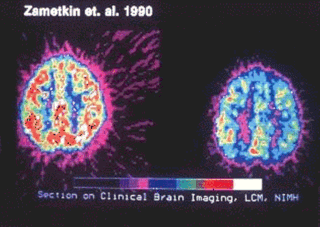
Attention deficit hyperactivity disorder (ADHD) is a behavioral and neurodevelopmental disorder characterized by inattention, hyperactivity, and impulsivity, which are pervasive, impairing, and otherwise age inappropriate. Some individuals with ADHD also display difficulty regulating emotions, or problems with executive function. For a diagnosis, the symptoms have to be present for more than six months, and cause problems in at least two settings. In children, problems paying attention may result in poor school performance. Additionally, it is associated with other mental disorders and substance use disorders. Although it causes impairment, particularly in modern society, many people with ADHD have sustained attention for tasks they find interesting or rewarding, known as hyperfocus.

Neurodiversity or ND, refers to variation in the human brain regarding sociability, learning, attention, mood and other mental functions in a non-pathological sense. It was coined in 1998 by sociologist Judy Singer, who helped popularize the concept along with journalist Harvey Blume. It emerged as a challenge to prevailing views that certain things currently classified as neurodevelopmental disorders are inherently pathological and instead, adopts the social model of disability, in which societal barriers are the main contributing factor that disables people. This view is especially popular within the autism rights movement. The subsequent neurodiversity paradigm has been controversial among disability advocates, with opponents saying that its conceptualization is based on wishful thinking and may downplay, ignore or even romanticize serious mental conditions and illnesses, as well as argue that the idea is largely endorsed by those with low support needs and does not reflect the realities of individuals who have higher support needs.

Psychology Today is a media organization with a focus on psychology and human behavior. The Psychology Today website features therapy and health professionals directories and hundreds of blogs written by a wide variety of psychologists, psychiatrists, social workers, medical doctors, anthropologists, sociologists, and science journalists. Psychology Today also publishes a bimonthly magazine, which first appeared in 1967.

Hyperfocus is an intense form of mental concentration or visualization that focuses consciousness on a subject, topic, or task. In some individuals, various subjects or topics may also include daydreams, concepts, fiction, the imagination, and other objects of the mind. Hyperfocus on a certain subject can cause side-tracking away from assigned or important tasks.

Adult attention deficit hyperactivity disorder is the psychiatric condition of attention deficit hyperactivity disorder (ADHD) in adults. About one-third to two-thirds of children with symptoms from early childhood continue to demonstrate ADHD symptoms throughout life.
Sluggish cognitive tempo (SCT) is a syndrome related to attention deficit hyperactivity disorder (ADHD) but distinct from it. Typical symptoms include prominent dreaminess, mental fogginess, hypoactivity, sluggishness, staring frequently, inconsistent alertness and a slow working speed.
In medicine and psychology, emotional lability is a sign or symptom typified by exaggerated changes in mood or affect in quick succession. Sometimes the emotions expressed outwardly are very different from how the person feels on the inside. These strong emotions can be a disproportionate response to something that happened, but other times there might be no trigger at all. The person experiencing emotional lability usually feels like they do not have control over their emotions. For example, someone might cry uncontrollably in response to any strong emotion even if they do not feel sad or unhappy.
Russell Alan Barkley is a clinical psychologist who is a clinical professor of psychiatry at the VCU Medical Center and an author of books on attention-deficit hyperactivity disorder (ADHD). Involved in research since 1973 and a licensed psychologist since 1977, he is an expert on ADHD and has devoted much of his scientific career to studying ADHD and related fields like childhood defiance. He proposed to change the name of sluggish cognitive tempo (SCT) to concentration deficit disorder (CDD).
Attention deficit hyperactivity disorder predominantly inattentive, is one of the three presentations of attention deficit hyperactivity disorder (ADHD). In 1987–1994, there were no subtypes and thus it was not distinguished from hyperactive ADHD in the Diagnostic and Statistical Manual (DSM-III-R).

Attention deficit hyperactivity disorder (ADHD) controversies include concerns about causes, perceived overdiagnosis, and methods of treatment, especially with the use of stimulant medications in children. These controversies have surrounded the subject since at least the 1970s. Despite these controversies, ADHD is widely recognized and accepted by medical professionals, as are its treatments.

Edward McKey Hallowell is an American psychiatrist, speaker, New York Times best-selling author and podcast host. He specializes in ADHD and is the founder of the Hallowell ADHD Centers. Hallowell is the author of 20 books, including the Distraction series, co-authored with Dr. John Ratey.
ADDitude Magazine is the quarterly consumer publication about attention deficit hyperactivity disorder created and distributed by New Hope Media in New York, NY. It contains feature and service articles about ADD, ADHD and learning disabilities like dyslexia. It addresses topics including: diagnosing ADHD in children and adults, attention-deficit hyperactivity disorder treatments including medication and/or alternative therapies, parenting children with ADHD, learning disabilities and school challenges, and living with adult ADD. ADDitude Magazine is described by child psychotherapist Keath Low as "The happy, healthy lifestyle magazine for people with ADD."
The low arousal theory is a psychological theory explaining that people with attention-deficit hyperactivity disorder (ADHD) and antisocial personality disorder seek self-stimulation by excessive activity in order to transcend their state of abnormally low arousal. This low arousal results in the inability or difficulty to sustain attention on any task of waning stimulation or novelty, as well as explaining compulsive hyperactive behavior.

Susan Smalley, Ph.D. is a behavioral geneticist, writer and activist. The co-author of Fully Present: The Science, Art, and Practice of Mindfulness, she is the founder of the UCLA Mindful Awareness Research Center at the Jane and Terry Semel Institute for Neuroscience and Human Behavior (MARC), and professor emerita in the department of psychiatry and biobehavioral sciences at UCLA. Her research centers on the genetic basis of childhood-onset behavior disorders, such as ADHD, and the cognitive and emotional impact of mindfulness meditation on health and wellbeing. She has published more than 100 peer-reviewed papers and lectured globally on the genetics of human behavior and the science of mindfulness.
Hyperactivity has long been part of the human condition, although hyperactive behaviour has not always been seen as problematic.
Virginia I. Douglas was a Canadian psychologist. She was a professor at McGill University in Montreal, Canada, noted for her contributions to the study of attention deficit hyperactivity disorder (ADHD).

The ADHD Rating Scale (ADHD-RS) is a parent-report or teacher-report inventory created by George J. DuPaul, Thomas J. Power, Arthur D. Anastopoulos, and Robert Reid consisting of 18–90 questions regarding a child's behavior over the past 6 months. The ADHD Rating Scale is used to aid in the diagnosis of attention deficit hyperactivity disorder (ADHD) in children ranging from ages 5–17.
Professor Julia Rucklidge is a Canadian-born clinical psychologist who is the director of the Mental Health and Nutrition Research Group at the University of Canterbury in New Zealand. Her research has centered on mental health and nutrition.

Stephen P. Hinshaw is an American psychologist whose contributions lie in the areas of developmental psychopathology and combating the stigma that surrounds mental illness. He has authored more than 325 scientific articles and chapters as well as 14 authored and edited books. Currently, he is Professor in the Department of Psychology at the University of California, Berkeley, and Professor In Residence and Vice Chair for Child and Adolescent Psychology in the Department of Psychiatry at the University of California, San Francisco. His work focuses on child and adolescent mental disorders, clinical interventions, mechanisms of change in psychopathology, and stigma prevention efforts, with a specialization in ADHD and other externalizing behavioral disorders.
Joel Thomas Nigg is an American clinical psychologist known for his research on attention-deficit/hyperactivity disorder (ADHD). He is Professor of Psychiatry, Pediatrics, and Behavioral Neuroscience at the Oregon Health & Science University (OHSU), where he is also director of the Division of Psychology and of the ADHD program.









